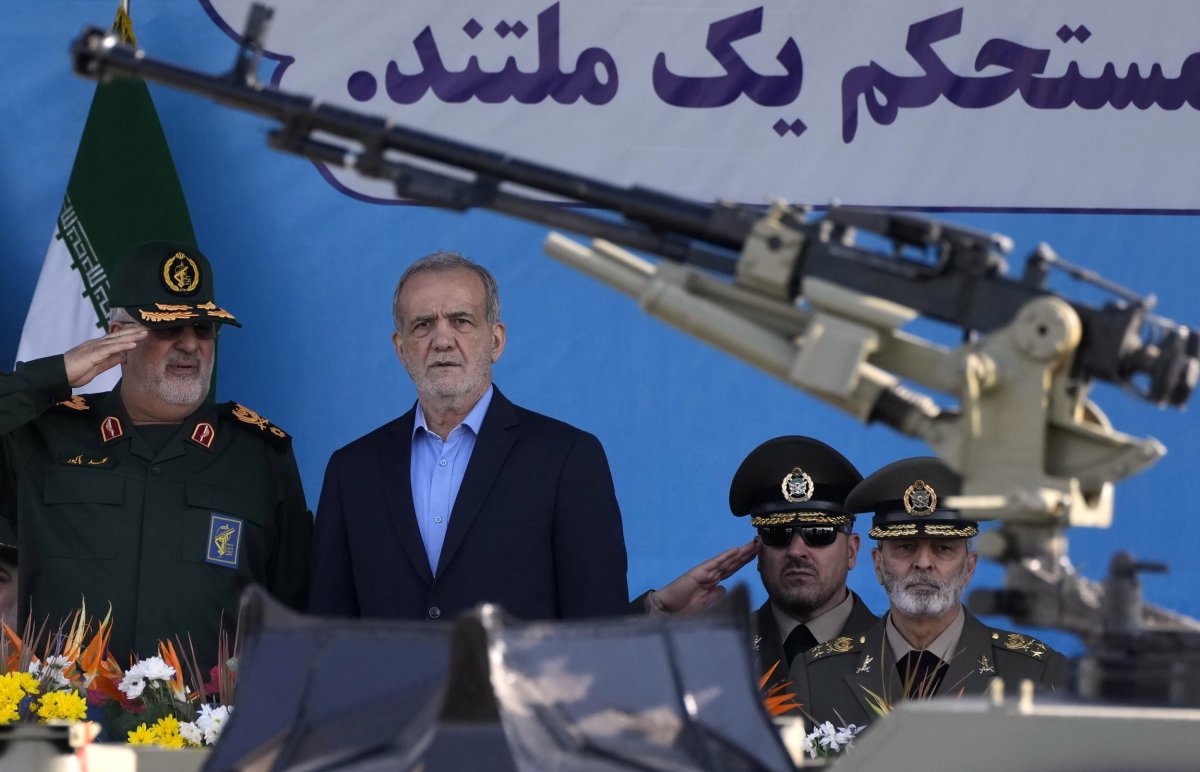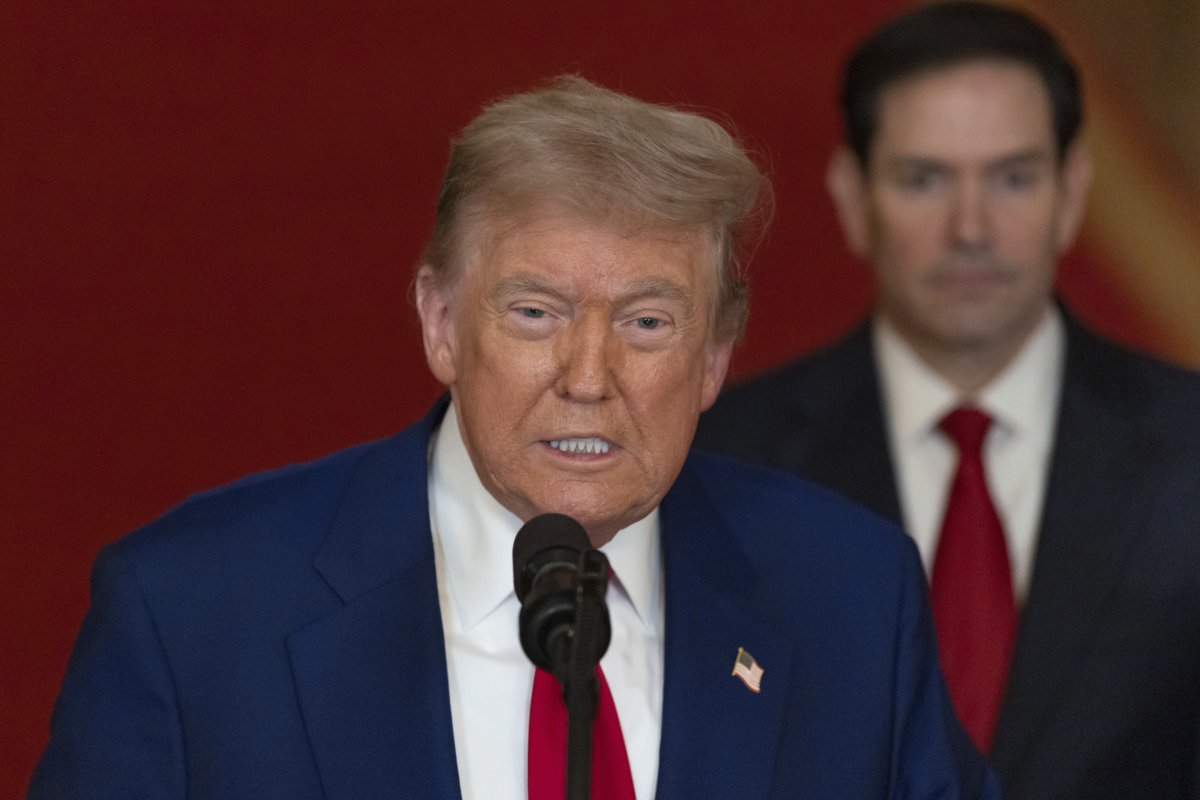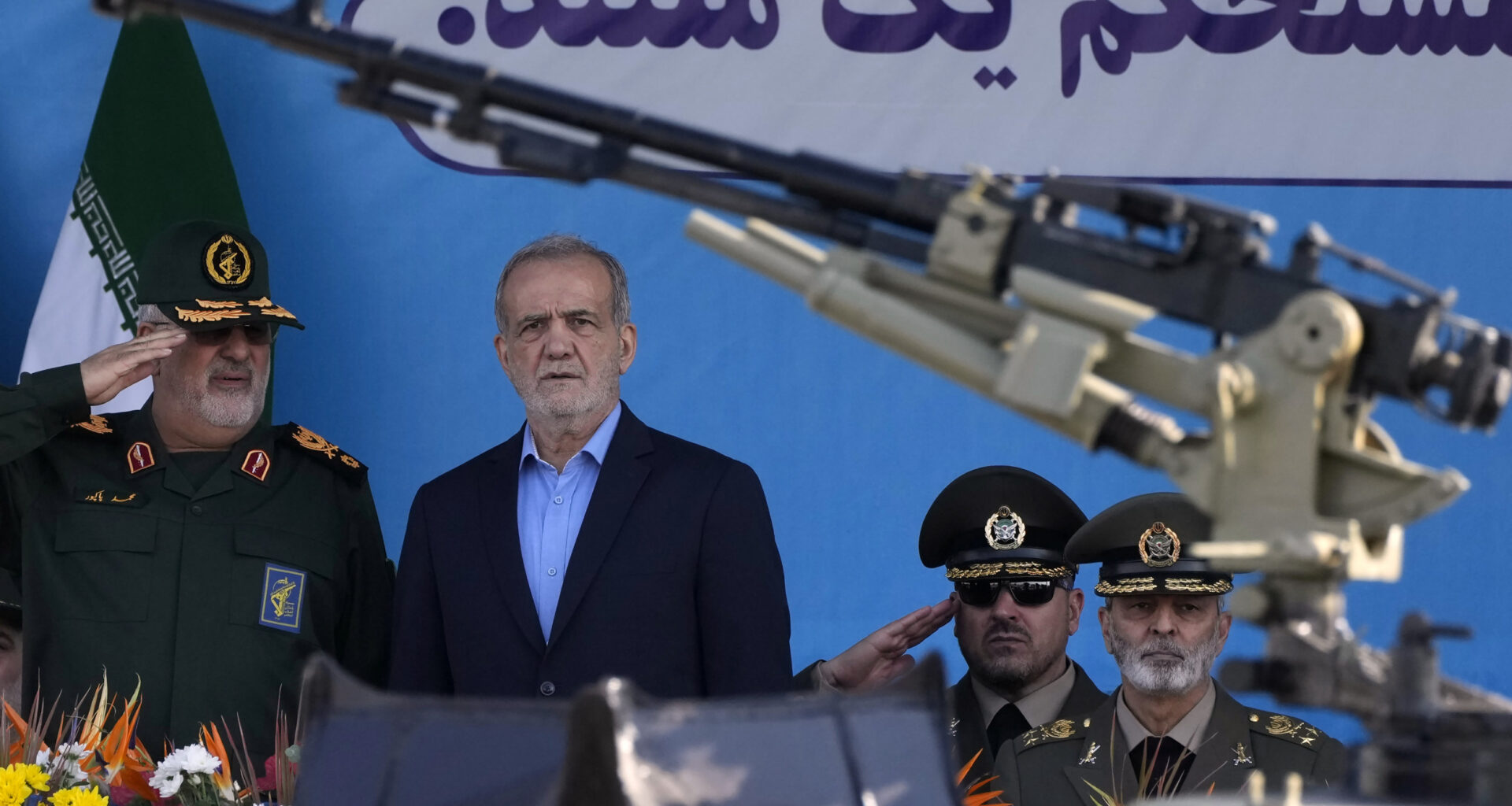Iran’s military leaders are warning the world that their forces are fully prepared to restart the war with Israel at any moment.
Even though a fragile ceasefire brokered by the U.S. has paused the recent 12-day conflict, Tehran says it will not back down or show mercy if attacked again, raising tensions across the region.
Newsweek has reached out the State Department and Iran’s foreign ministry for comment.
Why It Matters
The renewed warnings from Iran’s top commanders come as Israel signals that the recent fighting may not be over. With the U.S. pushing for diplomacy while keeping military options on the table, the Middle East remains on edge. How Iran responds next could shift the fragile balance between confrontation and peace.

Iranian President Masoud Pezeshkian, second left, listens to commander of the Revolutionary Guard’s ground force Gen. Mohammad Pakpour, left, as the army commander Gen. Abdolrahim Mousavi, right, stands while they review an annual armed forces…
Iranian President Masoud Pezeshkian, second left, listens to commander of the Revolutionary Guard’s ground force Gen. Mohammad Pakpour, left, as the army commander Gen. Abdolrahim Mousavi, right, stands while they review an annual armed forces parade marking the anniversary of the beginning of war against Iran by former Iraqi Dictator Saddam Hussein 44 years ago, in front of the shrine of the late revolutionary founder Ayatollah Khomeini, just outside Tehran, Iran, Saturday, Sept. 21, 2024.
More
Vahid Salemi/AP Photo
What to Know
Major General Mohammad Pakpour, commander of Iran’s Revolutionary Guard Corps (IRGC), said his forces are “fully prepared to resume combat from exactly where it stopped.” Speaking during a meeting with Iran’s Army chief, Major General Amir Hatami, Pakpour stressed that “the aggressors will not be spared” and praised the unity and determination of the Iranian people. He added that Iran will respond with full force only if war becomes necessary.
Nuclear Sites Claim
Meanwhile, The Trump administration is pushing back against a new intelligence assessment that contradicts President Donald Trump‘s repeated claims that U.S. airstrikes “obliterated” Iran’s nuclear facilities last month. According to five current and former U.S. officials familiar with the assessment, NBC News reported that while Iran’s Fordow nuclear enrichment site was mostly destroyed in the U.S. military operation, the Isfahan and Natanz sites may have only been set back by months and could resume operations. In response, Pentagon spokesperson Sean Parnell posted on X, “False. The credibility of the Fake News Media is similar to that of the current state of the Iranian nuclear facilities.”
False.
The credibility of the Fake News Media is similar to that of the current state of the Iranian nuclear facilities: destroyed, in the dirt, and will take years to recover. https://t.co/DzzXmY2sAG
— Sean Parnell (@SeanParnellUSA) July 17, 2025
Return to Talks?
As questions swirl around the long-term impact of the strikes, Iran’s foreign minister warned that any return to nuclear talks would only happen under terms Tehran views as fair and balanced. Following a call with his counterparts from France, Britain, Germany, and the EU‘s top diplomat, Foreign Minister Abbas Araghchi pushed back on Western pressure for a deal by the end of August, saying it was the U.S.—not Iran—that walked away from diplomacy. “It was the US that withdrew from a two-year negotiated deal, coordinated by the EU in 2015, not Iran,” Araghchi posted on X.
I had a joint teleconference with E3 FMs & EU HR last night, in which I made the following points clear:
It was the US that withdrew from a two-year negotiated deal -coordinated by EU in 2015- not Iran; and it was US that left the negotiation table in June this year and chose a… pic.twitter.com/NFQdK2HZD4
— Seyed Abbas Araghchi (@araghchi) July 18, 2025
What People Are Saying
Pentagon spokesperson Sean Parnell: “The credibility of the Fake News Media is similar to that of the current state of the Iranian nuclear facilities: destroyed, in the dirt, and will take years to recover.”
IRGC Commander Major General Mohammad Pakpour: “Our forces are fully prepared to resume combat from exactly where it stopped. The aggressors will not be spared.”
Israel’s Military Chief of Staff Eyal Zamir: “The campaign against Iran is not over. We are entering a new phase.”
Iranian Foreign Minister Abbas Araghchi: “It was the US that withdrew from a two-year negotiated deal -coordinated by EU in 2015- not Iran; and it was US that left the negotiation table in June this year and chose a military option instead, not Iran.”
What Happens Next
The ceasefire has paused the fighting, but tensions remain high. Iran’s commanders say they are ready to resume hostilities if provoked, while Israel says the conflict is unfinished. The U.S. is pushing for renewed nuclear talks but continues to threaten further strikes. Tehran says it will only return to negotiations under fair terms and rejects Western pressure. With diplomacy stalled and both sides digging in, the risk of renewed conflict remains dangerously real.

President Donald Trump speaks from the East Room of the White House in Washington, Saturday, June 21, 2025, after the U.S. military struck three Iranian nuclear and military sites, directly joining Israel’s effort to decapitate…
President Donald Trump speaks from the East Room of the White House in Washington, Saturday, June 21, 2025, after the U.S. military struck three Iranian nuclear and military sites, directly joining Israel’s effort to decapitate the country’s nuclear program, as Secretary of State Marco Rubio listens.
More
Carlos Barria/AP Photo
